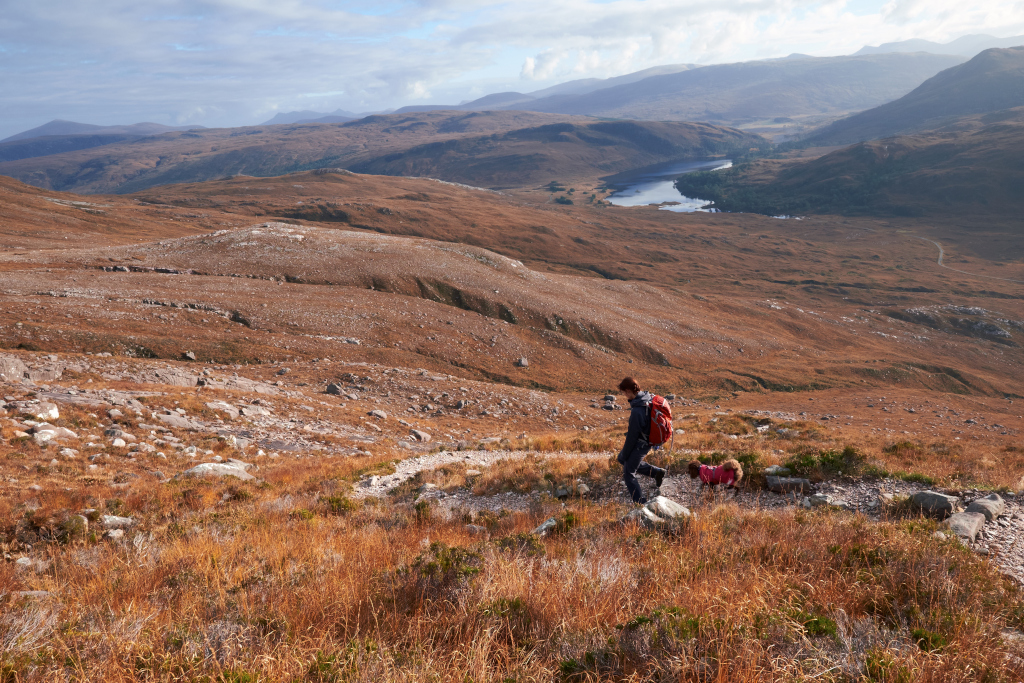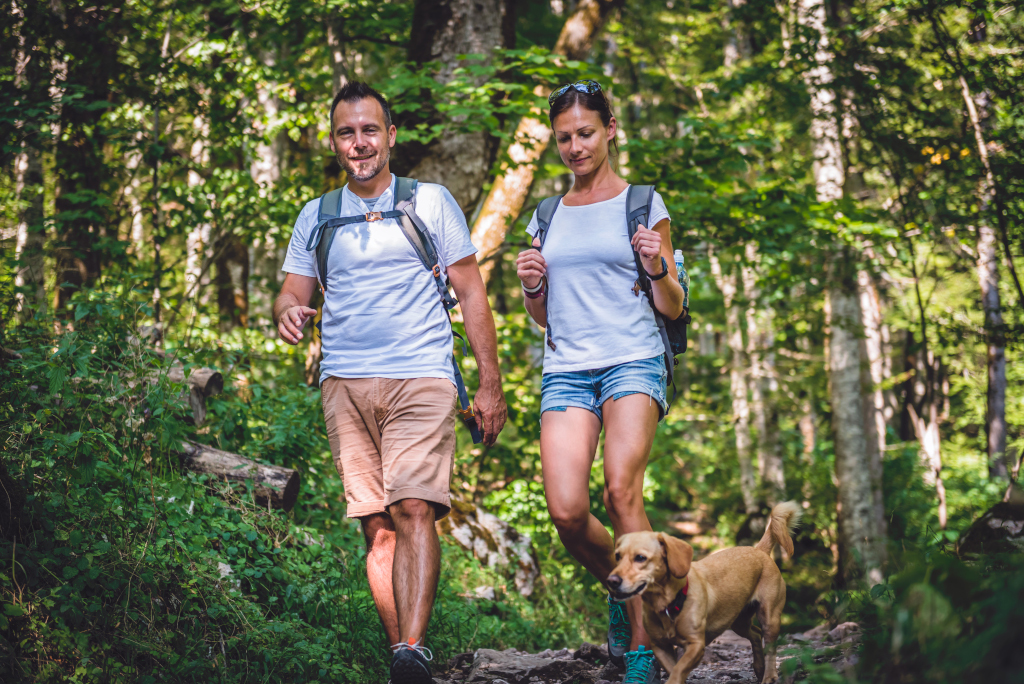What are some misconceptions about small dogs when it comes to heading off into the wilderness?
Many people assume that small dogs can’t hike long distances because of their size and their little legs.
However, this is actually not true!
Some small dogs have big ambitions to trek long distances, and they are very capable of doing this. In fact, you might be surprised to learn that some small dogs can even hike longer trails than some of their larger counterparts.
While petite pooches may have a slower pace than their larger canine friends, they are by no means lazy and can handle the physical activity required for a long hike as long as you train them and build up their stamina and endurance as you would for larger dogs.
So don’t let your little fur friend stay at home on those backpacking trips. They deserve to come with you too!
Read More: 9 Best Small Dog Breeds for Hiking
What Are Some Benefits of Bringing My Small Dog on a Hike?

There are many reasons you should bring your small dog on a hike, and here are a few benefits of having a little companion along for the journey.
1. There Will Be Less Confrontation With Other Canines on the Trail
One of the scariest things about heading out on a hike is perhaps not knowing how other hikers and their dogs will respond to your pup.
While some dog owners might assert that their pet won’t cause a fight, you never know until it actually happens in front of you. Sometimes a dog can be unpredictable in certain situations when they don’t know how to control themselves around unfamiliar animals or pets.
In addition, if you plan to venture on a more popular hiking trail, dogs of various sizes will likely be present. Some of these canines might not get along with your dog and might even try to attack your furkid.
Granted, this won’t happen often, but no one wants to take the risk.
If you have a small dog, it will be easier to avoid these confrontations with other canines because you can easily pick up your pup and carry them in your arms to protect them.
2. You Won't Have to Carry as Much Food and Water for Your Small Dog on the Hike
This reason is pretty straightforward. If you have a small dog, you don’t have to bring as much food and water as hiking with a larger canine.
This means that it will be easier to lighten your load, and you won’t have to deal with carrying heavy buckets of gear and supplies for your furry friend.
Read More:
3. Small Dogs are Easier to Carry if Something Happens
Hiking is undoubtedly a great exercise, but both you and your dog will be pushed to the limit if constantly trekking through rough terrain.
And you never know what could happen on a hike. Sometimes things can go wrong at the most inopportune times. One such example would be if your dog becomes injured during the trip and needs medical attention as soon as possible.
As you can imagine, it can be difficult to lift and carry an injured big dog, especially when you’re dealing with rough conditions.
On the other hand, small dogs are lighter to pick up and carry, making it much easier for you to transport them back to safety.
Read More: How to Carry an Injured Dog While Hiking
4. Small Dogs do Less Damage to the Environment and Trails
One of the many appeals to hiking is exploring nature’s beauty and enjoying pristine trails.
When you hike with a large dog, they can cause a lot of damage to the environment and even affect the trails that you’re using. For instance, they might dig up the soil and leave behind their big footprints on well-worn paths.
This could be frustrating for fellow hikers or endanger any flora in the area. In contrast, small dogs don’t have paws powerful enough to cause the same damage as big dogs.
Plus, small dogs will typically only leave behind small paw prints, and even if they do try to dig, the holes won’t be as large or deep, although you shouldn’t let them do that.
5. Fewer Poops to Pick Up
Whether you’re in a National Park or a common forested area, cleaning up after your dog is essential.
Now, if you have a big dog on the hike, this can sometimes be bothersome because there might be piles of poop left behind on the trail. And if you don’t pick up after them, it will pollute the environment, which can be dangerous to other pets and animals in the area. Plus, that will upset other hikers who tread upon these unsanitary messes.
Not saying that smaller dogs won’t poop, but you certainly will have a lot less waste to pick up.
Read More: 5 Easy Methods to Dispose of Your Dog’s Poop While Hiking
6. Small Dogs are Easier to Control
There’s no doubt about it that dogs might bolt off if they spot something interesting on the trail.
And this can create some problems for dog owners, especially those who have big dogs. And it can be difficult to stop them in time before they run into oncoming traffic or end up in precarious situations.
On the other hand, small dogs are much easier to control because they can’t pull on leashes as hard, although all dogs should understand basic manners and be well-behaved before hitting the trail.
Read More: The Basics Your Trail Dog Needs to Learn for Hiking
7. Small Pups are Much Easier to Care For During Your Hiking Trip
Let’s face it, taking care of your pet isn’t always easy, especially when out in the wilderness.
But like I mentioned earlier, you won’t have to worry about bringing as much food and water when hiking with a small dog. You also don’t have to bring as many dog toys or play with them as much because small pooches are likely to get tired after the hike. Plus, their gear is lighter to carry with you on the trip!
8. Small Dogs Can Easily Fit in a Doggie Carrier Backpack
You must have seen people carry their dogs in a backpack on social media.
But not all dogs can fit comfortably in a doggie carrier backpack. Now, small dogs don’t pose this problem because most of these packs are made for small- and medium-size dogs, allowing them to curl up and rest inside the entire hike.
And these carriers are not only comfortable for your pup, but since small dogs are lightweight, it won’t be as strenuous for you to carry them over long distances.
9. Small Dogs are Very Popular
It’s no secret that small dogs are immensely popular all over the world! I mean, everyone loves cute little pups.
That also means it’s likely that more people will want to interact with you and your little fur friend, opening up many opportunities to meet new people and make new friends on your hiking journey.
In fact, they might even want to join you on the trail and invite you to the next outing!
Things You Need to Know for Hiking With a Small Dog

1. Smaller Dogs Tend to Get Cold or Hot Quicker Than Bigger Dogs
Your little fur friend can easily get hot or cold on the trail because their bodies are more sensitive to the surrounding temperature.
So, don’t forget to bring a canine winter jacket or sweater if you plan to go snowshoeing with a small dog. It’s also imperative to pay close attention to your pup and watch for signs of frostbite and hypothermia.
Similarly, when hiking during the hot summer months, you would need to bring plenty of water for your small pup and stop for more cool-down breaks than you would with a larger breed to prevent heatstroke.
Read More:
2. Rough and Rocky Terrain Can be Hard for Small Dogs to Hike
A lot of hikers like to take off into the trails that are more rugged and rocky.
And this can be difficult for small dogs since their tender paws can be easily injured by jagged rocks, sharp sticks, or other hazardous objects. That’s why it’s always best to stick to groomed trails and get them a sturdy pair of boots to protect their feet.
Read More:
3. Steep Trails With Obstacles Might be Too Much for Small Dogs
If you love challenging hiking trails that take you up steep inclines, it might be difficult taking your small dog with you.
Small dogs won’t have the strength or endurance to climb big hills, nor can they handle trails with lots of big rocks and boulders. So, save these types of areas for your next big hike with a large-breed hiking dog.
4. Be Wary of Predators on the Trail
Small dogs may look like a tasty snack to predators on the trail, so always be aware of your surroundings and watch for predator signage.
You would want to leash your small pup and keep them with you at all times to ensure that a coyote or big cat doesn’t sneak up from behind. Also, make sure your small dog is always in view and never let them run ahead of you where they can become difficult to see.
Read More: 10 Common Trail Dangers to Be Aware of When Hiking With Dogs
Wrapping Up
Whether you’re a first-time hiker or an experienced trailblazer, taking your small dog for a hike is always a pleasure.
In fact, there are many benefits to hiking with a small dog. They are well-suited for these types of outdoor activities and can even prove to be great workout partners.
So what are you waiting for? Go ahead and take your small fur friend with you the next time you hit the trails!
Do you need help finding your next hiking trail? If you happen to live in: Seattle, Bay Area, San Diego, Los Angeles, Marin County, Denver, Santa Cruz, Tucson, Orange County, Utah, or Oahu, we’ve also written articles about the best dog-friendly hikes in each of these areas. Please check them out!

